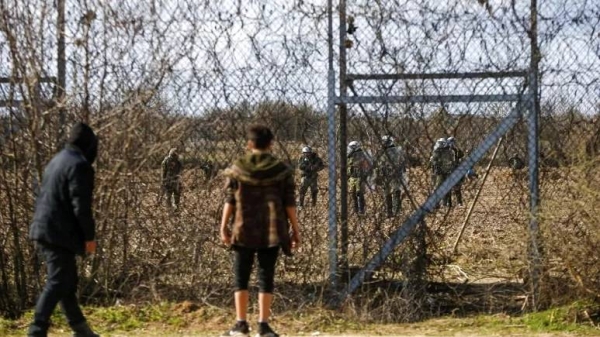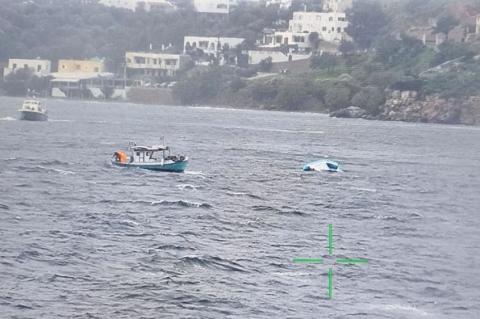
As the popular belief spreads that migrants are to blame for the fires that have ravaged Greece, self-organized civilian "militias" are hunting them down.
A man opens the back of his green camouflage van and triumphantly shows off the "25 pieces he hunted" earlier in the day.
His "hunting trophies" are terrified migrants.
The scene takes place in Evros, the border region with Turkey in north-eastern Greece, and as he speaks in the video he justifies his actions by blaming the migrants for the fires that have ravaged the region.
"They will burn us," he says, encouraging the Greeks to follow his example: "Organise to catch them! The mountains are full of them".
The migrants look into the camera without understanding what is happening, but the fear in their eyes is palpable. The post has thousands of reactions, with one anonymous user commenting: "Throw them in the fire".
Days later, the migrants told The Press Project that they had been beaten with metal bars. "They took off all our clothes and filmed us. We stayed there for a long time, sweating and unable to breathe".
With more than 73,000 hectares burned in six days, the wildfires around Alexandroupolis, the capital of Evros, have become the most devastating ever seen in the European Union.
The disaster has left the country searching for culprits, leading to a popular belief that migrants are responsible for the fires.
"There is a widespread rumour and local politicians are using it as a political tool because it"s easy to blame migrants. They don"t have a voice," Lefteris Papayannakis, director of the Greek Institute for Refugees, told Euronews.
"The authorities have received complaints about the way they have handled the fires. There"s always a need for an enemy to justify the government"s failure, so we find scapegoats to protect them. In Evros, it"s the migrants," he adds.
This has led to the emergence of civilian self-organised "militias" that commit unlawful acts of violence against migrants, according to the UN refugee agency.
Villagers dressed in black and heavy boots, resembling Greek special forces, form vigilante groups that now patrol the Evros border "looking for migrants", as stated in the Border Violence Monitoring Network report.
Although this is not a new phenomenon - NGOs have been denouncing their presence for several years - the summer wildfire situation in Greece has seen the re-emergence of these groups.
"The police and the military do not act against them. They tolerate them," says Papayannakis.
"The Greek government and media have been nurturing vigilante-style "migrant hunters" since 2020, allowing them to commit racist crimes with complete impunity," says Alarm Phone, an NGO that helps refugees in need of rescue at sea.
In recent days, more and more videos encouraging the hunting of migrants have been published on social media, despite measures taken by the Greek judiciary to stop these actions.
The three people who forced the migrants into their truck have been arrested and the Alexandroupolis prosecutor"s office has filed charges against all of them.
After they testified, they were placed under house arrest and had their passports revoked, their lawyer Vassilis Demiris said his clients were "fully remorseful".
Despite this, the Greek Supreme Court has ordered an investigation to find out more about the "alarming phenomena of violence" against migrants and whether there was an "organised plan" to provoke the fire, although authorities have suggested it was caused by lightning.
The Greek Council for Refugees has little hope that the investigation will change anything.
"This has happened before and nothing has changed. It"s not the courts that will modify the general perception, it"s the public narrative and the government"s narrative. We need the authorities not to target and criminalise migrants," says Papayannakis.
The 13 migrants were also taken into custody. They were charged with attempted arson and illegal entry, but released after testifying on Monday.
Gone are the days when Greece opened its arms to migrants from places like Syria. There has been a change in the discourse towards them and the climate is one of open hostility.
Public rhetoric has fuelled the politics of confrontation.
The latest controversy followed comments by Paraschos Christou Papadakis, a member of the Greek parliament for the ultra nationalist Solution party, who accused the migrants of "obstructing the work of the fire brigade" and starting wildfires.
"Although it was confirmed that the large wildfires raging in Evros have been started by a lightning strike, this has not stopped the racist and dangerous narratives being spread around the country," Adriana Tidona, Amnesty International"s spokesperson, told Euronews.
In a post on his social media, the Greek Solution MP described the situation as a "war" and called on people to organise raids to "arrest illegal migrants in the same way as in March 2020″.
That year, Turkey decided to open its borders, challenging the European Union, and thousands of migrants entered Greece via the Evros. It was the first time that vigilante groups appeared to “defend the border”.
"Papadakis" words seem to be inciting civilians to take action against migrants and refugees. There are other attempts to organise locals and civilians to commit illegal acts against these groups. It"s a very worrying trend," Tidona says.
“Evros has been for years an area where migrants are illegally pushed back, detained and tortured
by Greek authorities in order to return them to Turkey. The impunity with which Greece has committed these acts has likely contributed to the ongoing escalation of violent, xenophobic tendencies in the region,” she adds.
Euronews contacted the Greek Ministry of Citizens" Protection and the Greek police for comment. — Euronews











